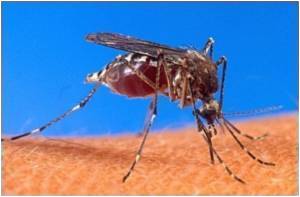A new vaccine for malaria, that supposedly imitates the effects of a mosquito bite, is offering a 100 percent protection to human volunteers, researchers claim

These sporozoites are then weakened so they cannot cause illness and incorporated into a vaccine which must be injected into a person's veins several times, with each shot about a month apart.
A test of the same vaccine two years ago that administered it into the skin of patients, the way most vaccines are given, showed protection in only two of 44 volunteers.
But the latest trial showed that injecting the vaccine into the bloodstream protected against malaria in all six volunteers who received a five-shot regimen at the highest dosage, according to the results published in the US journal Science.
Six of nine volunteers in a separate group that received four shots of the highest dose -- 135,000 sporozoites per injection -- were also fully protected against malaria, it said.
The study included 57 people -- including 40 who received the vaccine in varying doses and 17 controls.
Advertisement
"We need to repeat it in a larger number of people."
Advertisement
The company currently employs "about 12 to 15 'dissectors' who can each tease apart about 150 mosquitoes an hour," it said.
Sanaria's PfSPZ Vaccine contains "live, weakened, purified malaria parasites that do not cause illness," said a company statement.
"While we're still in the early stages of testing, we believe this vaccine will be used to eliminate malaria," said Hoffman.
"It's reasonable to suggest that within three-to-five years, a safe, reliable vaccine could be a commercial reality and provide medical benefit to a huge population."
Next, a series of small clinical trials are planned for Tanzania, Germany and the United States.
Malaria infected some 220 million people in 2010 and killed 660,000 according to the World Health Organization. Most of the deaths were among children in Africa.
Another vaccine effort under way is the RTS,S trial. Its phase III results, reported in Science in 2012, showed 31 percent effectiveness in young infants and 56 percent in older babies and toddlers.
Hoffman told Science he realized years ago that a single protein vaccine like RTS,S would "never do the job" of warding off malaria which is caused by a 5,000-gene parasite.
He was inspired instead by studies in the 1970s that showed 90 percent of volunteers were protected against malaria after getting more than 1,000 bites from infected mosquitoes that had undergone radiation to weaken the Plasmodium falciparum parasite.
"My colleagues and I are very excited about working with Sanaria," said a statement from Salim Abdullah, Chief Executive Director of Tanzania's Ifakara Health Institute.
"This great advance in the development of a whole parasite vaccine immediately opens up important opportunities for immunization studies in malaria endemic countries."
Science also quoted Pedro Alonso of the Barcelona Institute for Global Health in Spain, a leading researcher on the RTS,S vaccine, as saying the results were "extremely encouraging."
"This is a really important, really exciting proof of concept," he said.
Source-AFP














